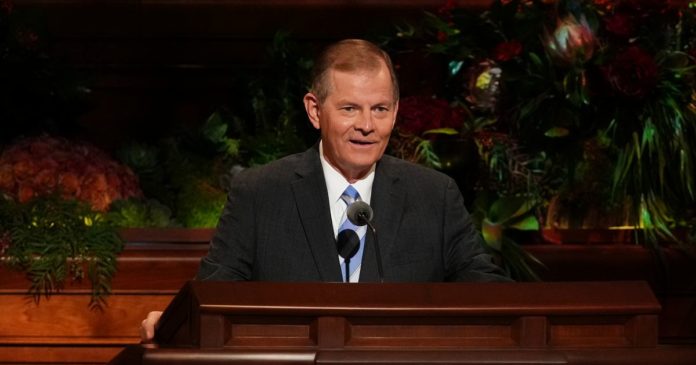
Plans by Logan-based iFIT Health & Fitness to go public on U.S. stock markets could bring immense windfalls for one current top leader of The Church of Jesus Christ of Latter-day Saints and another who recently stepped down.
As co-founder of one of the fitness equipment maker’s early predecessors, Gary E. Stevenson, a member of the faith’s Quorum of the Twelve Apostles, is nominated to become a board director as part of its initial public offering, documents reveal.
That IPO, delayed by company officials last week due to wild market swings, also stands to reward the 66-year-old church leader handsomely for nearly 43.4 million iFIT shares he has accumulated through the years, according to public filings with the Securities and Exchange Commission.
The company’s Oct. 1 IPO filings with federal regulators set an initial per-share price range for the prospective sale as high as $21 — which would raise the value of Stevenson’s current stock holdings in iFIT to $911.9 million.
Filings with the SEC also detail a $1.79 million loan to Stevenson by the company in 1999 that has since been forgiven and is listed as compensation. It was part of nearly $53.2 million in loans to managers the company said it forgave in preparation for the postponed offering.
Being a corporate board member would appear to violate a long-standing church policy discouraging Latter-day Saint apostles from serving on such boards.
In January 1996, the faith’s governing First Presidency asked the church’s general authorities to gradually withdraw from such positions, in light of growing ecclesiastical duties from a worldwide church membership that had topped 9.3 million at that point. That membership is now above 16.6 million.
A church spokesperson said late Monday that Stevenson had received a special dispensation from church authorities, “resulting from his legacy shareholdings and his role as a co-founder of the corporation.”
“Such permissions are considered and granted under exceptional circumstances on a case-by-base basis, and are rare,” spokesperson Doug Andersen said in a written statement.
Andersen said as an iFIT director, Stevenson attended board meetings, “but he is not involved in the day-to-day operations or financial management of the company.”
The church did not respond to inquiries as to whether other Latter-day Saint apostles have been granted similar exemptions nor as to what rules the church places on them for disclosing their business activities.
Also nominated to the iFIT board of directors as part of the IPO is Robert C. Gay, formerly a member of the church’s Quorum of the Seventy. With nearly 18 million shares, according to SEC documents, a share price of $21 would lift the 70-year-old’s holdings in iFIT to roughly $385.9 million.
(Keith Johnson | Special to The Tribune) Elder Robert C. Gay, a member of the Presidency of the Seventy, speaks during the 188th Semiannual General Conference of The Church of Jesus Christ of Latter-day Saints on Oct. 7, 2018, in Salt Lake City.
Appointed to the church’s First Quorum of the Seventy in 2012, Gay served in that body’s leadership. He was granted emeritus status earlier this month during the faith’s recent General Conference, according to the church, and that has exempted him from the policy on board memberships. Members of the Seventy typically join the emeritus ranks and step away from full-time church service after they turn 70.
Gay, with a long career in investment banking, has served as an iFIT company director since 1994, the company’s filings say. He is proposed to be iFIT’s lead independent director and act as liaison among other independent directors while also serving on the company’s regular 13-member board, documents indicate.
Attempts by The Salt Lake Tribune to reach Stevenson and Gay for additional comment were not successful.
Officials with iFIT, known until May as ICON Health & Fitness, said they put off the IPO set for last Thursday due to “adverse market conditions.” The firm has not yet set another date for the IPO, but officials have said they would continue to evaluate its timing.
Markets have grown volatile in recent weeks, partly in reaction to investor fears over effects from the delta variant of the coronavirus.
A competitor to Peloton, iFIT is known as the maker of the popular NordicTrack and has seen its fortunes rise in recent years, not least from heightened interest in working out at home during the COVID-19 pandemic. The gross value of its merchandise sales of interactive fitness products — including exercise equipment, apparel and footwear — topped $2.8 billion in 2021.
The Logan company now has more than 6.4 million customers in 120 countries, its filing says.
Stevenson and Scott R. Watterson founded its predecessor, a company called Weslo Inc., in 1977 and bought a company called ProForm Fitness a decade later, according to SEC reports.
The church spokesperson noted that both “have served as board members since that time,” growing out of interests they developed while both were young Latter-day Saint missionaries in Asia — Stevenson in Japan and Watterson in Taiwan.
“Part of their desire,” Andersen said, “was to allow them to continue their travel to and association with the people of Asia.”
Stevenson, a native of Utah’s Cache Valley, was iFIT’s president and chief operating officer from 1988 to 2008, when he resigned from the company to accept a full-time assignment with the church and served as its presiding bishop from 2012 to 2015, the firm’s SEC filing says. The presiding bishop oversees the faith’s vastfinancial, real estate, investment and charitable operations.
Alongside his knowledge, experience and sense of continuity with iFIT and its industry, Stevenson is touted in company filings for his “leadership in global organizations.” Some of his ecclesiastical labors as an apostle and his affiliations with other institutions are also listed as qualifications for serving on iFIT’s new board.
The company’s IPO disclosure, made after Gay was granted emeritus status, makes no direct mention of his positions with the church. But it does highlight his humanitarian work and professional involvement since 1984 with private equity investment firms such as Palo Alto-based Huntsman Gay Global Capital, which he helped co-found, as well as his stints “as a member of the board of multiple private and public companies.”
Stevenson and Gay are among 15 named executive officers and nominated directors with major stakes of company shares in iFIT who would benefit from the IPO, according to its filings, with a total of 247.9 million shares among them.
The firm had prepared to issue a total of 35.4 million shares in last Thursday’s aborted IPO, with potential to boost the company’s valuation to just under $7 billion. Under that deal, Stevenson would have held 13.8% of the company’s stock post-IPO and 3.2% of its voting power, while Gay would have had 5.8% of stock and 1.4% of voting power.
Watterson holds 218 million shares, the biggest stake among proposed company officers with more than 5% of the firm’s shares. Stevenson’s 43 million shares are the second largest stake, SEC filings show, while Gay’s stock holdings make up the fifth largest.








